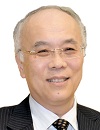- JST Home
- /
- Strategic Basic Research Programs
- /
 CREST
CREST- /
- Research Area/Projects/
- Completed/
- [Structural Life Science] Structural Life Science and Advanced Core Technologies for Innovative Life Science Research
[Structural Life Science] Structural Life Science and Advanced Core Technologies for Innovative Life Science Research
※ Affiliations and titles are as of the end of the research activity.
Strategic Objective
Creation of new technologies for breakthrough in understanding and predicting biological activities and intermolecular interactions by means of “Novel Structural Life Science” that contributes to new medical treatment and prevention of various diseases, food safety enhancement and environmental improvement
Research Supervisor

Keiji Tanaka (Director, Tokyo Metropolitan Institute of Medical Science)
Outline
This Research Area aims to integrate cutting-edge life science areas with structural biology for creating “structural life science” and advanced core technologies that will lead to innovation in life science. It will address fundamental problems in life science by integrating advanced methods of structural analysis seamlessly and establishing general principles for elucidating and predicting dynamics of hierarchical structures ranging from the atomic to the cellular and/or tissue levels.
The recent large-scale research projects in structural biology in Japan have achieved major advances in determination of protein structures with biological significance. Proteins play key roles in biological events; however, they do not function alone. Therefore, the next important step is to determine the dynamics of such proteins and to study the functional mechanisms underlying the interactions among proteins and various other biological macromolecules. For example, many diseases of animals and plants are caused by protein abnormalities. Thus, structural life science, a new branch of science proposed for understanding biological phenomena of fundamental importance based on structural methods, should play an essential role in elucidating molecular mechanisms and developing new therapeutic methods and means of disease prevention. The structural life science approach is also required for promoting a healthy and long-lived society, establishing safe food production systems, and solving environmental problems. Structural life science addresses these issues by establishing general principles underlying temporal and spatial changes of biological systems at the atomic or molecular level and by predicting dynamics of biological phenomena from these principles.
Utilizing the structural life science approaches, this CREST Research Area seeks to analyze dynamics of important functional machineries involved in biological phenomena, for example, large protein complexes and organelles; to identify pathogens and determine their structures in complex with cognate interaction molecules; to search efficiently lead compounds for structure-based drug discovery processes; and to create advanced technologies required for such studies.
Research Area Advisors
・Yoshinori OHSUMI, Ph.D.
The Title of Honorary Professor, Tokyo Institute of Technology
・ Takashi GOJOBORI, Ph.D.
Vice-Director, National Institute of Genetics
・Ichio SHIMADA, Ph.D.
Professor, University of Tokyo
・Motowo NAKAJIMA, Ph.D.
Director & CSO SBI Pharmaceuticals Co.Ltd.
・Toshio HAKOSHIMA, Ph.D.
Professor, Nara Institute of Science and Technology
・Yoshinori FUJIYOSHI, Ph.D.
Professor, Nagoya University
・Toshio FURUYA, Ph.D.
President & CEO PharmaDesign,Inc.
・Masayuki MIURA, Ph.D.
Professor, University of Tokyo
・Yuriko YAMAGATA, Ph.D.
Professor, Kumamoto University
・Masasuke YOSHIDA, Ph.D.
Senior Research Fellow, Kyoto Sangyo University
Year Started : 2012
Elucidation of the structural and functional network with mitochondria as a hub
Research Director:
Toshiya Endo (Professor,Department of Molecular Biosciences、Kyoto Sangyo University)
Structural biology of infection and carcinogenesis by Helicobacter Pylori
Research Director:
Toshiya Senda(Professor, High Energy Accelerator Research Organization “KEK”)
Structural studies of the mitochondrial respiratory chain – structure impacts efficiency-.
Research Director:
Tomitake Tsukihara (Professor, University of Hyogo)
Structural basis of biological system for energy metabolism using dihydrogen
Research Director:
Yoshiki Higuchi(Professor, University of Hyogo)
Research Director:
Shuya Fukai(Associate Professor, The University of Tokyo)
Research Director:
Akihito Yamaguchi(Professor, Osaka University)
Year Started : 2013
Dynamic structural lifescience of protein machinery driven by ATP/GTP
Research Director:
Toshio Ando(Professor, Kanazawa University)
Research Director:
Toshiaki ISOBE(Professor, Tokyo Metropolitan University)
Research Director:
Yutaka Ito(Professor, Tokyo Metropolitan University)
Structural Studies on the transient macromolecular complexes formed upon photoacclimation
Research Director:
Genji, Kurisu(Professor, Osaka University)
Research Director:
Toshiyuki Shimizu(Professor, The University of Tokyo)
Research Director:
Kazuhiro Nagata(Professor, Kyoto Sangyo University)
Structural life science for unveiling membrane dynamics during autophagy
Research Director:
Nobuo N. Noda(Chief Researcher, Microbial Chemistry Research Foundation)
Year Started : 2014
Cellular structural biology of cilia/flagella
Research Director:
Masahide Kikkawa(Professor, Graduate School of Medicine, The University of Tokyo)
Research Director:
Seiji Takashima(Professor, Graduate School of Medicine, Osaka University)
Structural studies of the proteins working in novel cell membrane potential signal
Research Director:
Atsushi Nakagawa(Professor, Institute for Protein Research, Osaka University)
Asymmetrical distribution of phospholipids at plasma membranes, and its breakdown
Research Director:
Shigekazu Nagata(Specially Appointed Professor, Immunology Frontire Research Center,Osaka University)
Research Director:
Miyo T. Morita(Professor, Graduate School of Bioagricultural Sciences, Nagoya University)













